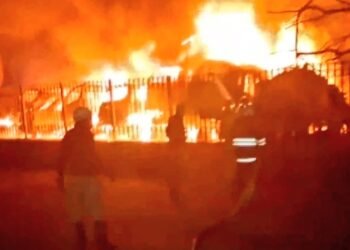The political and security situation in Manipur continues to deteriorate as the Centre announces the deployment of 50 additional CAPF companies, totaling over 5,000 personnel. This move follows escalating violence in the region and criticism of Biren Singh government’s handling of the crisis.
By PC Bureau
The Modi government continues to pursue a military response to the ongoing ethnic violence in Manipur. Despite mounting pressure and calls for a change in leadership, the central government has opted to deploy an additional 50 companies of Central Armed Police Forces (CAPF), comprising over 5,000 personnel, to the violence-ridden state. This decision comes amid escalating unrest and a rapidly deteriorating law and order situation, official sources confirmed on Monday.
Following the withdrawal of support by BJP ally, the National People’s Party (NPP), which accused Chief Minister Biren Singh of failing to address the crisis, the central government has faced increasing pressure to take political action. Despite these demands, the Modi administration has refused to concede to calls for replacing Biren Singh or imposing President’s Rule in the state.
Sticking to its strategy of exhausting the elements fueling the violence, the government has significantly bolstered the presence of security forces in the region. This additional deployment comes after the Ministry of Home Affairs (MHA) had already sent 20 CAPF companies—15 from the Central Reserve Police Force (CRPF) and five from the Border Security Force (BSF)—last week, following outbreaks of violence in Jiribam district and other areas. The new deployment, expected to arrive by the end of this week, will consist of 35 CRPF units and 15 BSF units.
With these new deployments, the total number of CAPF companies stationed in Manipur will rise to 218, further reinforcing the Centre’s efforts to contain the violence. CRPF Director General A D Singh and senior officers from other CAPF units are already in the state, closely monitoring the security situation.
The deployment strategy is currently being devised in consultation with the state government and the Ministry of Home Affairs, based on the levels of violence in various districts. Forces will be positioned where they are most needed, with a focus on regions witnessing the highest levels of unrest.
Union Home Minister Amit Shah is expected to hold a crucial meeting on Monday to review the security situation and finalize a comprehensive strategy to stabilize the state. His meeting will likely result in further measures to tackle the “volatile” situation, which has been exacerbated by protests and widespread violence in the wake of the discovery of the bodies of women and children.
In light of the mounting violence, the MHA has ordered all security forces deployed in Manipur to take decisive actions to restore public order. The ministry has emphasized that strict action will be taken against anyone involved in violent or disruptive activities, with a particular focus on armed groups from both the Meitei and Kuki-Zo communities.
The unrest in the state has led to the reimposition of the Armed Forces (Special Powers) Act (AFSPA) in six police station areas, including the Jiribam district, which has been severely affected by the violence. The AFSPA, which grants security forces special powers to maintain order in conflict zones, was reintroduced last Thursday as a response to the growing instability in the region.
The ethnic violence between the Meitei community, based in the Imphal Valley, and the Kuki-Zo communities, based in the hill districts, has claimed more than 220 lives and displaced thousands since May 2023. What began as localized clashes has now spread throughout the state, with previously peaceful regions like Jiribam witnessing violence for the first time, following the discovery of a mutilated body in June.
The government is facing significant challenges in restoring peace, with curfews, internet shutdowns, and increased military presence marking the current strategy. Despite these measures, the violence has shown little sign of abating, leaving many concerned about the long-term stability of the state.













